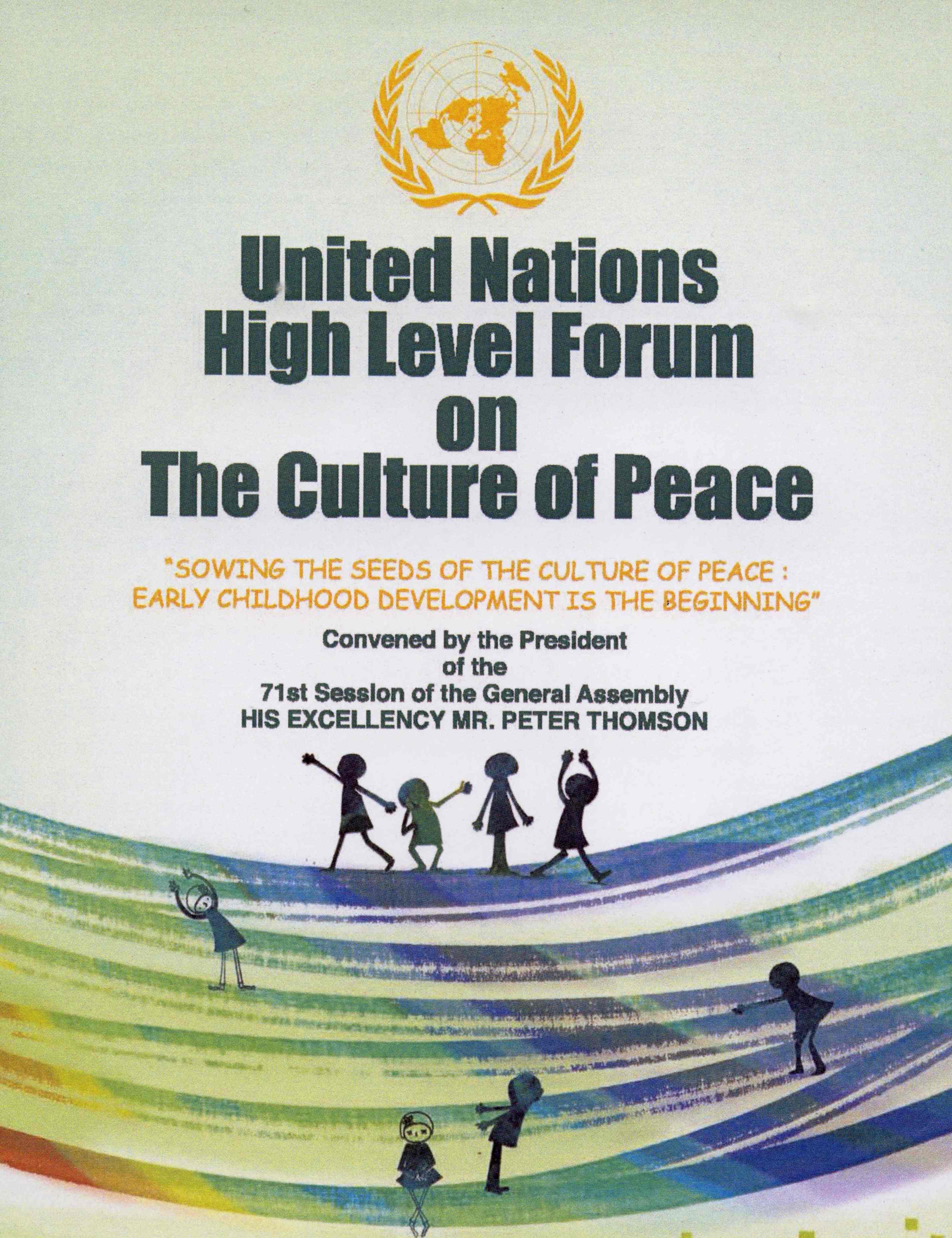World Goodwill Attends 2017 Forum on Culture of Peace at UN

Every year since 2012 the President of the UN General Assembly has convened a High-Level Forum on the Culture of Peace. With the support of member nations (102 governments sponsored the resolution calling for this year’s event) the Forum aims to highlight emerging trends impacting on the realization of the culture of peace, defined as a set of values, attitudes, traditions and modes of behaviour and ways of life based on universal principles of freedom, justice and peace. In 1999 the General Assembly passed a Declaration and Programme of Action on the Culture of Peace, and these annual Forums are a way of ensuring that this long-term agenda does not get lost amid all the activity at the United Nations.
World Goodwill was delighted to attend this year’s Forum. Opening the session General Assembly President, Peter Thomson of Fiji, reminded us that the culture of peace requires work from individuals as well as nations and international organisations “to promote understanding of our common humanity … and inspire people’s hopes for the future.” A representative of the UN Secretary-General and Nobel Peace laureate Betty Williams, then addressed the gathering.
Betty Williams spoke with great heart about her work on behalf of children. Forty years ago, she witnessed the shooting and tragic death of three children on the streets of Belfast. I made a promise to those children that I would fight for the rest of my life that they did not die in vain. The mothers of the world, she said, are the sustenance of this world. Following her work in Northern Ireland to ensure that children could grow up with peace and justice and love, she began to be invited to visit places around the world where mothers and children were facing violence and suffering. I couldn’t believe what I was seeing!
Having witnessed, up close and personal, the plight of children, Betty Williams told Forum participants that I get very passionate about my work. It’s time to give the children a voice. The only thing that can save the planet is the children. But children are suffering in the many wars and violent conflicts around the world. So, I’m here today to beg. I have no problem begging for a child. I beg you at the UN, anybody who can see the insanity of what is happening, to lobby for percentages of military budgets to be used for the well-being of children. If we are going to have a better planet, we had better be good to the children.
The morning session concluded with a series of statements in support of the Programme of Action on a Culture of Peace by Member States.
The afternoon session was largely taken up with a panel discussion on the theme Sowing the Seeds of the Culture of Peace: Early Childhood Development is the Beginning. Chaired by the founder of The Global Movement for the Culture of Peace, and former UN Under-Secretary-General and High Representative, Ambassador Anwarul K. Chowdhury, panelists included former UNESCO Director-General Federico Mayor; the UN Secretary-General’s Special Representative on Violence Against Children, Dr. Marta Santos Pais; UN Ambassadors from Honduras and Hungary; and Dr Nancy Hardt, Professor Emerita of University of Florida, College of Medicine.
Special Representative Santos Pais highlighted that investment in early childhood is crucial both to ensure children's development and to build peaceful and inclusive societies around the world. Early childhood is where everything starts, and it is also where investment can achieve the highest returns. Dr Hardt brought the discussion about the enormous benefits to be derived from investment in early childhood development to the local level with an account of practical steps taken in her community in Florida, USA, to develop neighborhood based services combining law enforcement and health care. Within four years the community saw a reduction in unintended pregnancies, reduction in premature births, and a stunning reduction in cases of child abuse and neglect to address suffering and inequities. These developments are being further enhanced with a new diverse partnership between law, medicine, psychology and restorative justice.... “Peace for Gainesville”, closely aligned with the River Phoenix Center for Peacebuilding.
Building the Culture of Peace is clearly a long-term goal for the United Nations. It is a work in process, embracing every aspect of the transformation of human relations so that they may be more fully aligned with principles of sharing and the practice of mutual understanding and cooperation within nations and between nations. This High-Level Forum helped to remind participants and member nations of the need for constant focus on the long-term goal and the short-term goals detailed in the Programme of Action agreed to in 1999.
http://www.un.org/pga/71/event-latest/high-level-forum-on-the-culture-of-peace/
Watch webcasts of the event:
For a fuller report and links to transcripts of talks: http://www.xunicef.org/2017/09/transcription-excerpts-former-cf-staff-peace-sowing-seeds-early-child-dev-webcast-7-sep-2017/